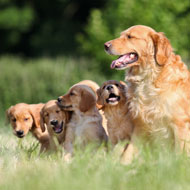Inbreeding reduces litter size in golden retrievers - study

Researchers found that, on average, a dam that is 10 per cent more inbred than another will produce one less puppy per litter.
Inbreeding in golden retrievers reduces the overall size of the litter, according to new research.
The study, led by the Morris Animal Foundation Golden Retriever Study, is one of the first to examine measures of inbreeding in domestic dogs, rather than using pedigree-based estimates.
Conducted with partners at Embark Veterinary Inc, the results have been published in the journal Mammalian Genome.
“This scientifically proves something we’ve known anecdotally for a few years; that fecundity, or the measure of how successfully a dog can reproduce, is threatened by inbreeding,” said Dr. Erin Chu, senior veterinary geneticist at Embark.
“Breeders need to ensure that the dogs they choose to mate maintain diversity in their lineages to preserve healthy and successful breeds.”
In the study, researchers examined DNA and phenotype data from 93 female golden retrievers enrolled in the Golden Retriever Lifetime Study. All the dogs were reproductively intact and had only been bred once.
They found that the degree to which a dog was inbred influenced the number of puppies it gave birth to. The results show that, on average, a dam that is 10 per cent more inbred than another will produce one less puppy per litter.
Researchers say the finding ‘sets the stage’ for a larger investigation to analyse the genomic regions associated with fecundity and other measures of fitness, such as negative behaviour, mortality and longevity.
“There are definite repercussions to being more inbred with every generation and we want to minimise those as much as possible,” said Dr. Janet Patterson-Kane, chief scientific officer at the Morris Animal Foundation, “This is something to keep in mind to ensure we have healthy breed populations for years to come.”



 The RCVS has announced a new version of its 1CPD mobile app, with enhanced features for veterinary surgeons and veterinary nurses to record their continuing professional development.
The RCVS has announced a new version of its 1CPD mobile app, with enhanced features for veterinary surgeons and veterinary nurses to record their continuing professional development.